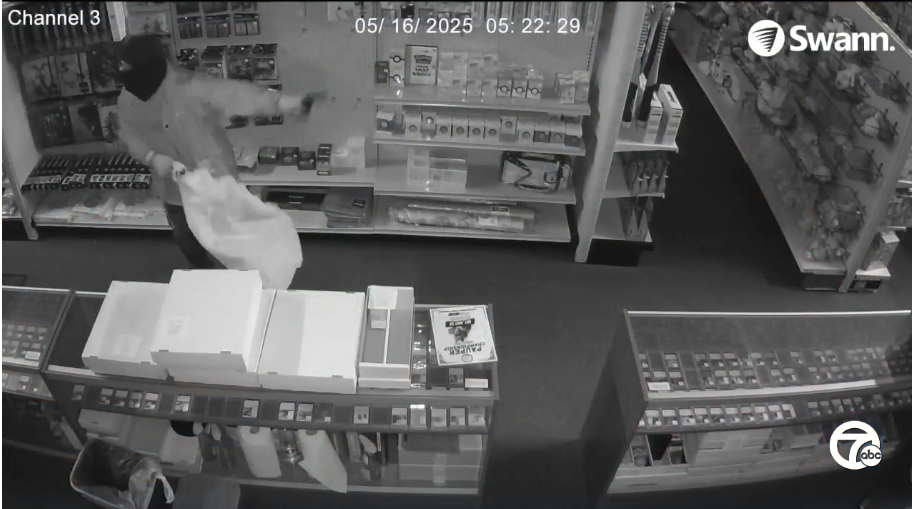From childhood nostalgia to high-stakes collectibles, the world of Pokémon trading cards has become a lucrative market that attracts more than just enthusiastic card gamers. In a puzzling twist of events more fit for a crime drama, two card shops in the Detroit metro area have been left picking up the pieces after what can only be described as brazen, hammer-wielding break-ins with a singular focus: Pokémon cards.
The quiet Friday morning routine at RIW Hobbies & Gaming in Livonia was violently disrupted when intruders decided to make an early morning call. Unlike regular customers who would enjoy a leisurely browse through treasures of pop culture, these visitors were anything but courteous. Owner Pam Willoughby was startled and disheartened when she reviewed her security footage only to find two masked individuals making their entrance through the shattered front door in a shower of glass shards, swinging hammers like manic artists before landing their strikes on unsuspecting merchandise.
“They weren’t just stealing — they were swinging wildly at things for no reason,” Willoughby lamented. It was as if they were on a chaotic quest, with hammers as their unfortunate scepters. Rather than appearing as straightforward criminals, they seemed to execute a frenzied dance, leaving a trail of confusion in their wake more than just a physical mess. But their chaotic antics had a cold calculus underpinning it: they knew exactly which trading cards held the most unappreciated potential—sometimes worth thousands of dollars per card to the right collector.
The timing of this affront did not go unnoticed; it coincided seemingly too perfectly with the opening day of the Motor City Comic Con — a convergence of vendors and eager collectors buzzing with energy and wallets at the ready. “They knew there’d be a market for what they stole,” Willoughby asserted, suggesting that the robbers were perhaps more akin to opportunistic entrepreneurs than random thieves.
No sooner had the weekend adventure at RIW Hobbies cooled into embers of broken dreams than the burglars struck again, as if working a meticulous itinerary. When dawn broke four days later, Eternal Games in Warren found itself embroiled in a similar morning of chaos. The solitary masked figure that descended upon the shop skipped the destruction of glass. Instead, this person seemed to be working from an invisible blueprint, zeroing in on the counter like a heat-seeking missile, efficiently pilfering Pokémon paraphernalia without any unnecessary movement.
Assistant manager Dakota Olszewski could only marvel at the methodical precision on display. “They knew exactly what they wanted,” he said simply, still caught somewhere between disbelief and a grudging appreciation for the burglar’s efficiency. The job was unerringly direct—a no-nonsense smash, grab, and spirited escape that left one wondering if it was perhaps planned during a planning heist 101 seminar over community college Zoom meetups.
These recent targets aren’t isolated incidents either. The game of burglar-tag with local card shops isn’t anything new. December last saw a duo masquerading as customers before striking in Macomb County. Though eventually captured, their antics left ripples of anxiety across the community—a paranoia not easily dismissed.
Both Willoughby and Olszewski, now more than just aficionados of collectibles, are doubling as security czars, reinforcing doors, adding yet more lenses to the eye of their ever-watchful security cameras, and spreading the word among other small business owners to keep their guards up. There’s a tangible sense that, beyond merchandise, the sanctity of a safe space has been penetrated. “It’s not just the inventory,” Willoughby underscored. “It’s the feeling of being safe in your own space. That’s what they took.”
While the local constabulary has yet to link the incidents formally, their clockwork similarities—the predawn hours, the hammer-wielding entry, and the precise pursuit of high-value cards—have detectives keeping an open mind to connections, like an investigative Sherlock searching for the unifying theory.
To those who manage and own trading card shops, this acts as a stark reminder that the boundary between hobby and high-stakes investment is thin. With the value of these once-simple cards soaring to dizzying heights, interest no longer comes solely from avid players or wide-eyed kids clutching their pocket money. Indeed, the allure extends to nefarious quarters, making owners ever more vigilant guardians in this high-stakes treasure hunt where the greatest risk is always human avarice.
For the community, it’s a call to arms—or at least a call to eyes—as vigilance becomes paramount in preserving both the cherished nostalgia these cards represent and the burgeoning ambitions they now also embody. With police urging information be shared to nip these escapades in the bud, the hope remains that future excitement in the trading card world remains secure within the vibrant community it has spawned, rather than a target hanging in a dark alley’s shadow.
